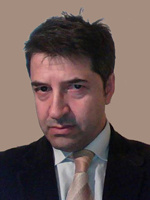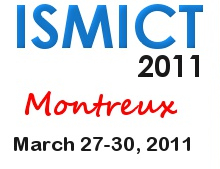Go to
Francesco Valgimigli
 Director, Technology and Scientific Affairs
Director, Technology and Scientific Affairs
A. Menarini Diagnostics, Italy
Overview of the commercially successful Implantable Glucose Sensors: Key features and requirements for Performance, Safety and Reliability
In recent years one of the more successful field of development of fully or partially implantable medical devices has been the one of the sensors for monitoring blood glucose in diabetic patients. As a natural evolution of the devices for Self Monitoring of Blood Glucose based on fingerstick and application of a blood drop on a glucose biosensor strip, a new category of innovative, implantable devices have been introduced into the market. These devices, usually referred as Continuous Glucose Monitoring Systems (CGMs), can be applied or implanted in the human body for days or weeks, and are able to measure continuously the glucose concentration. Only few technologies succeeded as commercial products, due to the challenging requirements for an acceptable use. A review of these technologies will be developed, and analysed the issues addressed for a successful clinical application in terms of performance, safety and reliability.
About the speaker:
Francesco Valgimigli is Head of Technology and Scientific Affairs at A. Menarini Diagnostics, an Italian company founded in 1976 as a division of the multinational pharmaceutical group A. Menarini Industrie Farmaceutiche Riunite, and operating in the market of Diabetes Care, where achieved growing positions in Europe. He has a Master Degree in Electrical Engineering and a PhD in Biomedical Engineering from the Universities of Florence and Bologna, Italy respectively, and more than 20 years of experience working as product designer and project manager in the In Vitro Diagnostics and Medical Device industry.
In A. Menarini Diagnostics Francesco is involved since 1996 in medical products development, and new devices clinical validation. His main achievements have been in design of laboratory instrumentation for haematology, devices for Self Monitoring of Blood Glucose in diabetic patients (SMBG) and innovative, implantable Continuous Glucose Monitoring Systems (CGMs). In these areas he conducts research on biosensor technology, biocompatibile membranes for implantable sensors and sampling techniques of biomolecules from the human body. Francesco is responsible for development teams and multidisciplinary projects, also in co-operation with international research institutes and industrial partners world-wide. Previously, he held roles in various medical industry organisations, mainly in R&D management. Francesco holds various patents and has published many articles in peer-reviewed journals.
Secondary navigation
- EPFL Workshop on Logic Synthesis and Emerging Technologies
- Luca Amaru
- Luca Benini
- Giovanni De Micheli
- Srini Devadas
- Antun Domic
- Rolf Drechsler
- Pierre-Emmanuel Gaillardon
- Jie-Hong Roland Jiang
- Akash Kumar
- Shahar Kvatinsky
- Yusuf Leblebici
- Shin-ichi Minato
- Alan Mishchenko
- Vijaykrishnan Narayanan
- Ian O'Connor
- Andre Inacio Reis
- Martin Roetteler
- Julien Ryckaert
- Mathias Soeken
- Christof Teuscher
- Zhiru Zhang
- Symposium on Emerging Trends in Computing
- Layout synthesis: A golden DA topic
- EPFL Workshop on Logic Synthesis & Verification
- Luca Amaru
- Luca Benini
- Robert Brayton
- Maciej Ciesielski
- Valentina Ciriani
- Jovanka Ciric-Vujkovic
- Jason Cong
- Jordi Cortadella
- Giovanni De Micheli
- Antun Domic
- Rolf Drechsler
- Henri Fraisse
- Paolo Ienne
- Viktor Kuncak
- Enrico Macii
- Igor Markov
- Steven M. Nowick
- Tsutomu Sasao
- Alena Simalatsar
- Leon Stok
- Dirk Stroobandt
- Tiziano Villa
- Symposium on Emerging Trends in Electronics
- Raul Camposano
- Anantha Chandrakasan
- Jo De Boeck
- Gerhard Fettweis
- Steve Furber
- Philippe Magarshack
- Takayasu Sakurai
- Alberto Sangiovanni-Vincentelli
- Ken Shepard
- VENUE
- Panel on Circuits in Emerging Nanotechnologies
- Panel on Emerging Methods of Computing
- Panel on The Role of Universities in the Emerging ICT World
- Panel on Design Challenges Ahead
- Panel on Alternative Use of Silicon
- Nano-Bio Technologies for Lab-on-Chip
- Functionality-Enhanced Devices Workshop
- More Moore: Designing Ultra-Complex System-on-Chips
- Design Technologies for a New Era
- Nanotechnology for Health
- Secure Systems Design
- Surface Treatments and Biochip Sensors
- Security/Privacy of IMDs
- Nanosystem Design and Variability
- Past Events Archive
Downloads
Presentation Slides:
SPIMD flyer including workshop schedule (250 KB pdf)
EPFL campus map (2.3 MB pdf)
Registration
Registration is free of charge. Please send an e-mail with subject line "SPIMD workshop registration" to anil.leblebici@epfl.ch to register. Make sure to state your full name and affiliation.


